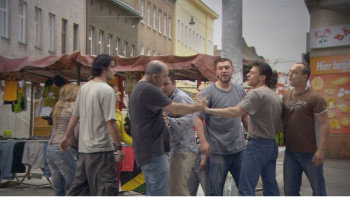Mark Lewis
dal 2/10/2008 al 29/11/2008
Segnalato da
Le Grand Cafe' Centre d'art contemporain
2/10/2008
Mark Lewis
Le Grand Cafe' Centre d'art contemporain, Saint-Nazaire
The artist has been exploring cinematic processes since the mid 1990s, interrogating their history and their conventions, and methodically wrong-footing the techniques of commercial Hollywood productions. He makes what he calls a "part cinema", the pieces of which dwell on the vocabulary of film: credits, extras, sets, travelling shots... His work is frequently filmed in CinemaScope, converted to DVD or to high definition digital files, and presented as large-scale projections directly onto the wall.

Curator: Sophie Legrandjacques
Philippe-Alain Michaud, art historian and theorist, will present Mark Lewis' work. He is Curator of Film at the Musée National d'art moderne Centre Georges-Pompidou in Paris. He has a special interest in the intersection of art history with cinema.
Mark Lewis has been exploring cinematic processes since the mid 1990s, interrogating their history and their conventions, and methodically wrong-footing the techniques of commercial Hollywood productions. He makes what he calls a 'part cinema', the pieces of which dwell on the vocabulary of film: credits, extras, sets, travelling shots … His work is frequently filmed in CinemaScope, converted to DVD or to high definition digital files, and presented as large-scale projections directly onto the wall.
Mark Lewis' activity as a whole explores the language of film, working as much with cinema's past (its history, its modes of representation and narration, its technical and formal possibilities) as with the constitutive elements common to painting and photography. He works with the material of the image itself and questions the manner in which we understand it. His short and silent films are veritable visual intrigues, unnarrated and often set in the heart of everyday life: the everyday life of the modern city. The spectator is presented with an exercise in decoding and a strange experience of 'déjà-vu', while at the same time Lewis recomposes the disparate elements of his notion of a 'permanent cinema'.
Mark Lewis' films have often been spoken of as pure temporal experiences. His films have for that matter neither beginning nor end. Less emphasis has been given to their extraordinary capacity to express and explore place. "Most of Lewis' works deploy the long take [which] is inseparable from the place where it is shot. […] All those who have made the long take their own, from Kubrick, Michaelangelo Antonioni and Wim Wenders to Chantal Ackerman, Michael Snow, Jia Zhangke and Tsai Ming-Liang, have a deep understanding of place. Lewis does too. Many of his works have been made in the places where he has lived, and most were inspired by locations he has known or stumbled across. […] For all their particularity his locations seem to be quite generic too. There are parts of Vancouver and south London that could be just about any modern city. Watching his films, we confront that strange double articulation of place that is becoming so typical of modern life: we are here now, but we could be nowhere or anywhere". And the critic David Campany goes on to write: "a similar fate is befalling cinema as it fragments and disperses itself across the face of visual culture. Cinema may be particular to cinemas, but we watch it anywhere these days, from television and laptops to aeroplanes and art galleries. [Mark Lewis] is a rare artist who can show us the deep connections between the fate of place, the fate of time and the fate of their representations".*
The exhibition at the Grand Café will present a considerable number of films by Mark Lewis including two previously unshown works: Cinema Museum (2008) and The Fight (2008).
* David Campany, Frieze, May 2008.
David Campany is the author of Art and Photography (Phaidon 2003) and Photography and Cinema (Reaktion 2008). He lectures at the University of Westminster.
Work by Mark Lewis will be exhibited in the Canadian Pavilion at the next Venice Biennale, in June 2009. At the same time, in parallel with the Pavilion project, a film concerned with 'rear projection' will be shown, co-produced by the Grand Café with the Van Abbesmuseum (Holland), BRITDOCART (UK), the galerie serge le borgne (Paris), the National Film Board of Canada and the Monte Clark Gallery (Canada). The film, somewhere between fiction and documentary, will retrace the incredible history of the rear projection, a technical procedure that allows the background to evolve behind the actor in Hollywood films – from Alfred Hitchcock to Sofia Coppola.
Press trip Friday 3 October
Opening reception from 7pm
Le Grand Cafe', Centre d'art contemporain
Place des Quatre z'horloges 44 600 - Saint-Nazaire
Hours: Daily (except Monday) 2PM to 7PM, Wenesday 11AM to 7 PM
Free admission



